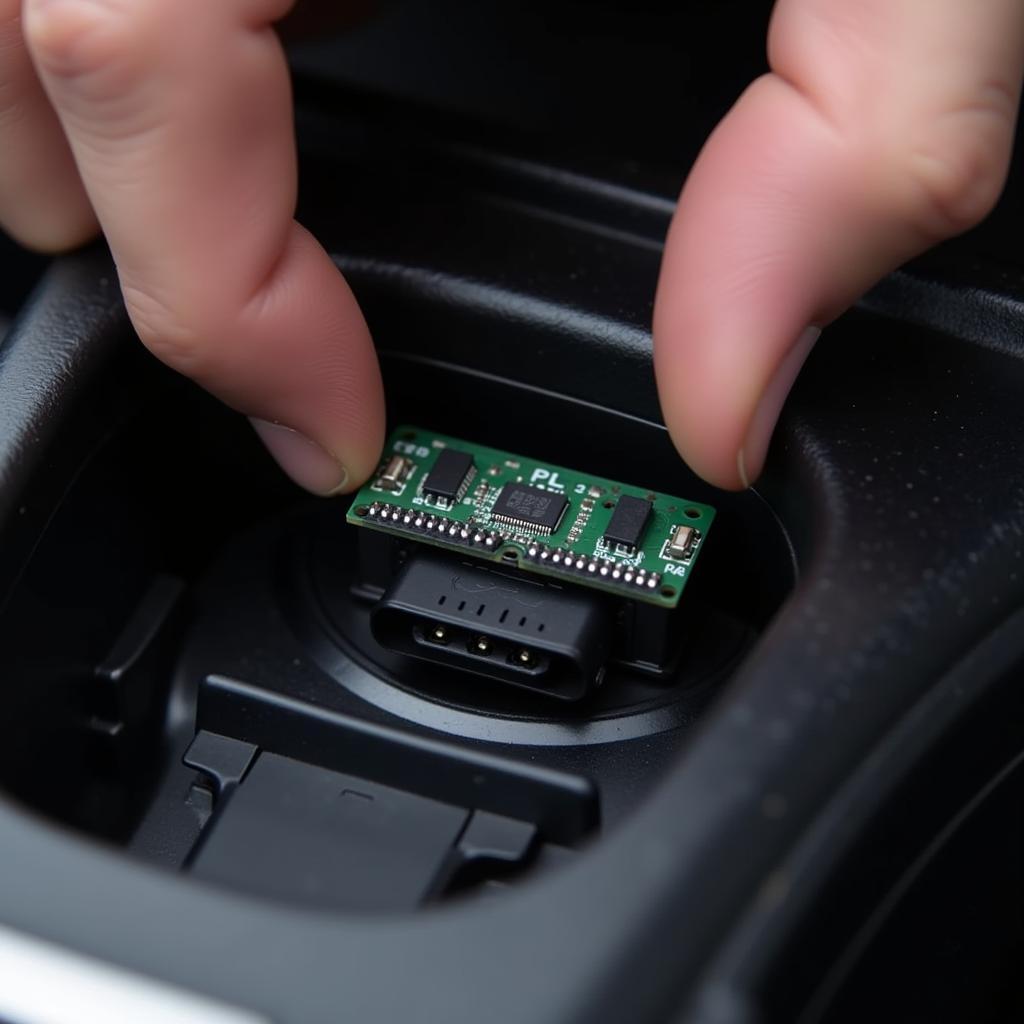OBD2 performance chips are devices that plug into your car’s OBD2 port, promising to boost horsepower and improve fuel efficiency. But do these chips live up to the hype, or are they too good to be true? This article delves into the world of OBD2 performance chips, exploring their functionality, potential benefits, and drawbacks.
Understanding OBD2 and Engine Management Systems
Before we assess the effectiveness of performance chips, it’s crucial to understand how your car’s engine management system works. Modern vehicles utilize an Engine Control Unit (ECU), a sophisticated computer that optimizes engine performance by monitoring various parameters like air intake, fuel injection, and ignition timing. The OBD2 port, mandated in vehicles since 1996, acts as an interface for accessing the ECU’s data.
How OBD2 Performance Chips Claim to Work
OBD2 performance chips are essentially pre-programmed devices designed to modify the ECU’s settings. When plugged in, they claim to adjust parameters such as fuel-to-air ratio, ignition timing, and boost pressure (in turbocharged engines) to enhance performance. Manufacturers often advertise significant horsepower and torque gains, along with improved fuel economy.
The Reality of OBD2 Performance Chips
While the concept may sound appealing, the effectiveness of OBD2 performance chips is debatable and often shrouded in skepticism. Here’s why:
- Limited Scope of Modification: The OBD2 port primarily serves as a diagnostic interface, allowing access to limited ECU parameters. While some adjustments are possible, drastically altering performance parameters requires deeper access to the ECU, often achieved through specialized tuning software and hardware.
- Generic Programming: Many OBD2 performance chips utilize generic programming that may not be optimized for your specific vehicle make, model, and engine. This one-size-fits-all approach can lead to subpar results or even potential engine damage.
- Oversimplified Solutions: Engine tuning is a complex process that involves meticulous calibration based on numerous factors. Relying solely on a plug-and-play chip to achieve significant performance gains oversimplifies this intricate process.
Potential Risks and Drawbacks
Using OBD2 performance chips can present certain risks, including:
- Voiding Your Warranty: Installing aftermarket devices like performance chips can void your vehicle’s warranty, particularly if they are found to have caused damage to the engine or other components.
- Engine Damage: Improperly calibrated performance chips can disrupt the delicate balance of your engine’s operation, potentially leading to increased wear and tear, overheating, or even catastrophic engine failure.
- Fuel Economy Myths: While some manufacturers claim improved fuel efficiency, this is often misleading. Performance chips typically encourage the engine to run richer (more fuel), potentially decreasing fuel economy.
Exploring Alternatives to OBD2 Performance Chips
If you’re looking to enhance your car’s performance, consider these alternatives to OBD2 performance chips:
- Professional ECU Tuning: Consulting a reputable tuner who specializes in your vehicle’s make and model is a safer and potentially more effective approach. Professional tuners use specialized software and hardware to access and modify the ECU’s parameters, creating custom tunes tailored to your specific vehicle and driving style.
- Performance Parts Upgrades: Upgrading components like the intake, exhaust, and intercooler can improve airflow and enhance performance. While these upgrades may require more investment, they offer tangible benefits and are less likely to cause engine damage when installed correctly.
Conclusion
While the promise of quick and easy performance gains might be tempting, OBD2 performance chips often fall short of expectations and carry potential risks. Understanding how your car’s engine management system works and exploring safer, more effective alternatives like professional ECU tuning or performance part upgrades is crucial for making informed decisions about enhancing your vehicle’s performance.
FAQs
1. Are all OBD2 performance chips ineffective?
While many OBD2 performance chips on the market offer minimal gains or are ineffective, some reputable brands may provide slight improvements for specific vehicle models. However, it’s crucial to research thoroughly and choose chips from trusted sources.
2. Can OBD2 performance chips damage my engine?
Yes, improperly calibrated or generic performance chips can disrupt the engine’s operating parameters, potentially leading to damage.
3. Is professional ECU tuning legal?
The legality of ECU tuning varies depending on local regulations and emissions standards. In some regions, it may be legal for off-road use only.
4. Do performance parts upgrades void my warranty?
Installing certain performance parts can void your warranty. Consult with your dealer or vehicle manufacturer for clarification.
5. Where can I find a reputable ECU tuner?
Online forums and communities dedicated to your vehicle’s make and model can be valuable resources for finding recommended tuners in your area.
Need Help Choosing the Right OBD2 Tool?
Contact us via WhatsApp: +1(641)206-8880 or Email: [email protected]. Our team of experts is available 24/7 to assist you.


